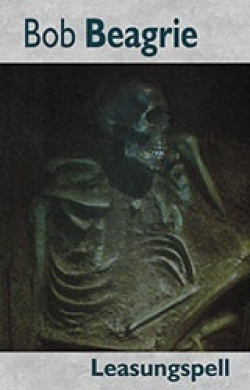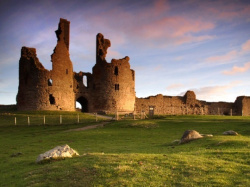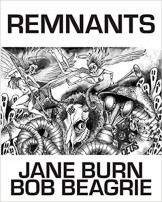My kind of poetry: Bob Beagrie

I like to toy with a notion that I came across years ago. I don’t know the source. I have a suspicion it could have been David Crystal; basically, it’s that if the accidents of history had taken a different shape, the governance of England could have set up its home in the north. York, say, or Durham. Great cultural and religious centres. The language and accent of the ruling classes would have been northern. I think it’s a lovely idea. I remember that the decision to let Wifred Pickles, a Halifax man, read the news during the war brought down a torrent of criticism. What’s remarkable is that when you listen to archive tape, he sounds remarkably RP. Whatever. This post will be about a northern poet and about what I’m going to call northwords. Bear with me.
It seems to me that all the poets I originally gravitated towards, and whose books I bought were ‘northern’. Or, at the least, not metropolitan. When they weren’t self-evidently ‘northern’ they were ‘regional’; they came with distinct voices that could not be described as RP, and would lose something important if they were read in RP … and I guess that what they would lose would be music, rhythm, texture. I’ve shared the idea with other writers that this poetry was somehow more ‘committed’, less inclined to be ironic, more inclined to wear its heart on its sleeve. I know it’s teetering on the edge of a generalising sentimentality, but I’m trying hard to be honest, to nail some kind of felt truth. One of my northern poet friends opined that ‘metropolitan’ poetry was ‘too cool for school’, that it prided itself in its avoidance of a felt emotional engagement. I don’t know if that’s accurate or fair. But something about it resonates enough for me to want to try to pin down that elusive idea of ‘north’ and ‘northernness’. It goes deeper than accent, which we can train ourselves to change. It springs from lexis, the words themselves, their resonance, their heft and texture. All the Old English, Germanic, Scandinavian words.
Words for where we are and where we might go: north, south, east west; here, there and everywhere; this, that and the other.
Words of house and home: gate, door, window (which is a wind-eye); roof, wall, and also fire and hearth (but not chimney, which is French)
Words of kinship: folk, father, mother, brother, sister, daughter and son, and child and children
Words for the earth: what we make of it - plough, sow, and seed and till - and where we come from and where we go: clay, and dust. Rocks and minerals and what we make with them: iron and gold, swords and ploughs, and hammers. Also, for the times and seasons of the earth: day, night, summer, winter, spring; its weathers, its sun, cold, rain, wind; and for the trees and flowers that grow from the earth ... rowan, birch, holly, oak, alder, thorn, beech; the names of the landscapes they grow in ... moors and fells, dales and denes, dens and cloughs, leas and thwaites, all of which make the names of places where we live.
Words for the seas: water, wave, froth and foam, wharf and staithe (also the boats and ships)
dWords for the textures of things: rough/smooth; hot/cold; wet/dry
If we grow up with these words, we grow up with their texture and music. When people tell me they recognise my ‘voice’ it must be partly to do with the accent and dialects of the West Riding. Along the way, I picked up Northumbrian inflexions, and some persist, the way the stress might fall differently, the rising inflexion at the end of a sentence. Lexis, syntax, accent; they go deeper than we know. Which is why I’m attracted to the poets whose ‘voice’ is not RP, and especially to those who deliberately celebrate the roots of their language. Ian Duhig is one, and so is Steve Ely. Irish poets can’t help it.

Bob Beagrie has published nine full collections of poetry and several pamphlets, most recently Leasungspell (Smokestack 2016), Nobody (Hunting Raven 2017), This Game of Strangers, written with Jane Burn (Wyrd Harvest Press 2017) and Remnants, written with Jane Burn (Knives Forks & Spoons Press (2019). His work has appeared in numerous anthologies and magazines and has been translated into Finnish, Urdu, Swedish, Danish, Dutch, Spanish, Estonian and Karelian. He is co-director of Ek Zuban Press & Literature Development and a founding member of the experimental spoken word and music collective Project Lono. He has worked as a writer in schools and community settings for 20 years and has held residencies at the Dylan Thomas Centre, Yorkshire Sculpture Park, the Hartlepool Headland, Crisis Skylight, and the James Cook Birthplace Museum. He lives in Middlesbrough and is a senior lecturer in creative writing at Teesside University. Now, over to him:
“Thanks for inviting me to contribute [(he’s sent four poems and explains that]) The first two are extracts from the first part of Leasungspell which was published by Smokestack in 2016. The book recounts the journey of an Anglo Saxon monk walking from the monastery on the Hartlepool Headland to Whitby in 657 AD, carrying secret correspondence from St Hild. The monk, Oswin, grew up a pagan and was converted to Christianity after his family was slaughtered by Mercian raiders and after having lived as a wild hermit for a time. As he treks across the wild landscape of the Tees estuary, animated by God’s light and the old earth spirits, he describes the things he encounters and tells the story of how he became a monk, and how the Princess Aelfleda arrived at the monastery. Due to there being not enough surviving vocabulary from 7th century Northumbrian the text is a creative hybrid of Old English, Modern English, Yorkshire, Northumbrian and Cleveland dialects.”
I decided to put the poems in a sequence that will take you from 8th century English to the recognisably modern, so you can see how rooted we are. Before you start, if it’s new to you, you may be as puzzled as I was at university when I was first set to read Beowulf. The thing was, no one told me to read it aloud, and to realise that I would actually hear words I was familiar with. There are two unfamiliar graphemes ð and þ. Anglo-Saxon text distinguished between two th sounds: soft (as in think) and harder, (as in though). You want to get the sound in your head, and the rhythm comes with it. Or you can listen to it first and then read it aloud yourself. It’ll be a labour of love. Here’s your link.
Oh, and here’s another thing. I know people who resist the fantastic, the magical, and these poems have a magical field as well as a history. Robert Macfarlane addresses this scientific/rational resistance to ‘magic’ when he writes, in Landmarks, about the provenance of a language he calls Childish.
“To young children ... nature is full of doors ... what we bloodlessly call place is to young children ... dream, spell and substance: place is somewhere they are always in, never on ... the best children’s literature understands this differeent order of affordance.”
I think this is what fed into a poem I wrote about ‘true naming’
you need one to be sent on a quest / through silent forests, stony wastes,
to a bony church and a hillside that opens
to a way that he’ll walk through all the ages, / to come dumb and dazzled to the seashore

Adríeme on the sands o’ wendan watterwegs
græ seolhs sunne-bathe, idel, gelic tide-smeðian roccs,
an’ hu thie honc, hu thie beorc te æn anoðer,
wisccars abristel, col eyes átrendle hwenne æfer thie
finde mi passen, an’ i wundor hwæt dríemes floe
ynneside thor flod-dog sculls. Sum sæy sum seolhs
are nae triewe seolhs at ealle but schyftars hwo hæfd clæþd
‘emsylfes in fur, cheosan te dwell healf thor lifes
as déor that dyf thruh ísceald bryne an’ iegstréam watters,
gnagan reaw fisc an’ hlæhh at gods an’ mancynn;
þouh þese be but léasspell for gowks an’ bearns.
Raðer, i recon thie wær ænes beons wið sāwls
hwo befeall sum gréate bane or bliht o’ hearm
an’ syððan lifian wiðin The Glōm for so lang
wiðoot sumyan te stier ‘em fram that trod,
hwo hæf forgietan thor lincs te mancynn
an’ cheose a life apart in the sealt sæ-tides,
on the blæc ecges o’ the woruld’s teahor ducts.
....................................................................................
The mann i sloh in Rheged hæfd oft huntede mi breost-hord
for alþouh we boþ feaht bealdlic wið spere an’ scield
for wiðercynings he wæs nae mi triewe foeman. i ken nae
his name, nawþer wyrre-cræft macod me sigoriend
an’ him woruld-deað, but raðer luc, God oþþe wyrd;
an’ slippian te soden grund wið a blodie gasc mi spere
hæfd oppened in his cræg i seo mesen thruh his deað-mist,
feolt a wearme wyllspring o’ mynd-floe o’ heah,
ruggig beorgas, steap wudu an’ scieldtrum dælls
spillan inti his inborn eorð, an’ ænlic þænne de i see hu
we ealle, as blostm o’ eorð, berst oþþe rot te gan ham.
So that thruh his deað i fund a paþ te faðfylness
for hwylc i hæfd oft gifen þancs un te him
an’ prayed he beon Heofon wið the Cyning o’ Cynings.
I’m willing to bet you found you fell into the rhythm, reading more quickly, until you were fluent
"through his death I found a path to faithfulness for which I have oft given thanks unto him ... the King of Kings’
You might want to say: Well, why not write it like that? To which I’d say: would you have paid the same kind of attention? I’ll leave that question there. Here’s Bob again:

Russell Hoban’s wonderful post-apocalyptic tale Riddley Walker is written in what seems to be an invented dialect. Remnants is its blood brother (or as Riddley would say, its moonbrother). The clue to reading it is the same as it is with Hoban’s story. Read it aloud. Think of a Northumbrian accent:
Remnants
The Old Man ysed t’ tac us oot onte the skerries
snot-slippy n’ green at doon-tide n’ lathered
wi’ flies that foggled awer feet as we padded
leery over the wyrm-stems o’ knotted kelp
te peer inte them rock pools, picking winkles,
ousting stones te latch them scuttling crabs;
the sea rose n’ fell aboot us, baring n’ covering
the boles o’ a petrified forest, the limpited ridge-tiles
of a once thrifty B & B called Neptune View,
the washed-oot bingo hall wi’ its drunk bandits
the barnacled spire of an ainchent kirk where
the One God once drooned. 'Hlisten!' he’d sush us,
'Sumetymes ye can harcen the kirk bells still
ringing undra the waves, calling all the Mer.'
At niyht I’d wayke, thinkin I'd heard ‘em,
te pry over ower stockade o’ scrap cars n’ cawld stores
across the flooden playn n’ wunder if the Mer
we're gatherin’ te march fro the deep watters
bringing the cawld furie o’ the Drooned God
upon the remnants o’ the bairns o’ men.
Efrey morning, for me learnings, the Old Man
had me recite the songs n’ psalms the Olders sang
onboard ship throughoot thor Greet Floating:
The Rhapsody o’ the Hrafen’s Skull
The Ballad o’ the Boar's Tusc
The Hymn o’ the Stag's Heart
The Canticle o’ the Whale's Lung.
I love the way the poem conflates elements of a contemporary present (the B&B, the bingo hall) with a timeless landscape of sea meeting land, and a past that exists in the rhythms of Tyndale’s Bible, in order to create a vision of the future.
The final poem is taken from Civil Insolencies, which will be published by Smokestack in October 2019. The language is now firmly, it seems, in the 21st century. But I hope that now you also hear where it came from, where its roots lie:
Chiromancy
“The great Sage as high as Heaven visited here”
Wu Cheng’en: Journey to the West 1592
High staggered moorland crossroads
Too few trees, the big wide sky
fresh roadkill and opportunist crows
turning turning turning turning,
The Roda Cross by the roadside
scattered offerings in the grass
Hogtenberg’s summit beyond Westerdale
Crouched friars, Rosedale Abbey, Cockayne Ridge
Roundhead recruits resting sore shanks,
tarmac’s scrape and sweep through crimples:
Life line, Fate line, Heart line, Sun line.
The cross's shadow pointing arrow straight
at Boulby Mine, turbines and the sea
turning turning turning turning,
sheep picking paths through cropped heather,
fleeces marked with red or blue splodges,
lichen forests spreading over dry stone walls.
I stand, one hand on the cross, turning,
aiming names at horizon markers
knowing the words can’t reach them,
how the crow-wind strips them bare,
how history is deciphering our footprints.
(Here are two more links to performances of the last two poems. We really spoil you on The Wider Web)
https://soundcloud.com/projectlono-1/remnant
https://soundcloud.com/user-635052693/chiromancy
Bob Beagrie, it’s been a pleasure to put this post together. You’ve been phenomenally generous. The last word is yours:
“The collection I wrote with Andy Willoughby, Sampo: Heading Further North, which is inspired by the national Finnish epic ‘Kalevala’, was published in three languages in three different countries during 2015. I consider myself a European poet and think that poetry, and creativity in general, can act as a bridge that is able to span cultural and linguistic boundaries. The act of translation is a process of reaching out, a tentative grasping of potential meanings to be carefully examined and carried back into one’s own language, and enrich it. This process seems more important than ever, given the rise of xenophobia and rightwing ideologies over the past few years.”
To which we can only say, “Amen’.




